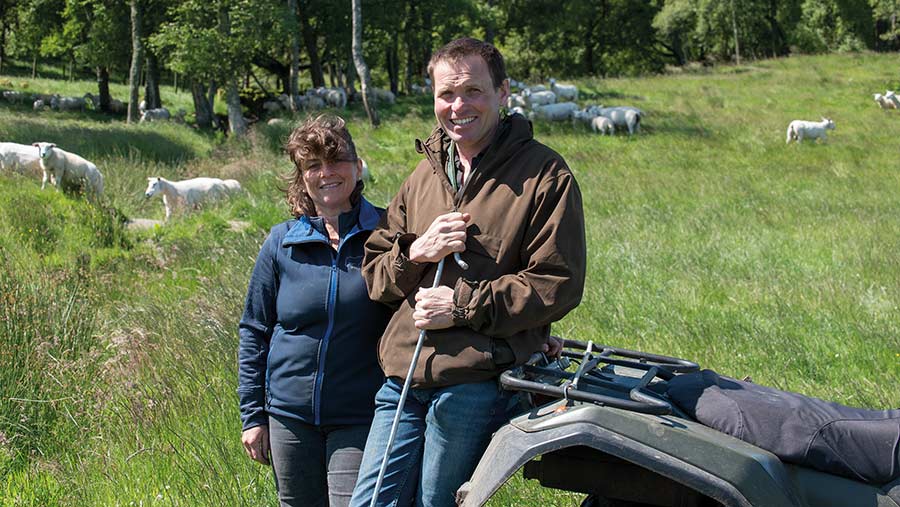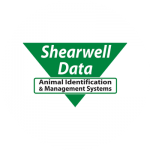Farmers Weekly Awards 2020: Sheep Farmer of the Year
 © Angus Findlay
© Angus Findlay Neil and Debbie McGowan, Incheoch, Blairgowrie, Perthshire
A progressive mindset, excellent stockmanship and rigorous evaluation of maternal traits has made Incheoch genetics profitable, functional and among the most sought after in commercial lamb production.
Farm facts
- 1,300 breeding ewes
- 800 Lleyn ewes and 100 Texels Signet recorded
- 500ha (1,236 acres), of which 364ha (899 acres) is grass – 48ha (119 acres) is rough
- 80-90 rams sold off farm through Working Genes sale
- 125ha (309 acres) of arable let out for malting barley, shelling peas and growing forage crops
- 220 Luing and Simmental cattle recorded
- Prime lambs sold deadweight to Woodheads, Turriff
Modern ram buyers are increasingly seeing their purchase as an investment in a breeder’s system and genetic package.
This is why Neil and Debbie McGowan’s exacting standards and unwavering commercial focus with their Lleyn and Texel ewes at Incheoch are yielding success.
They understand maternal ability is a top priority for many commercial farms and the “hard-to-measure maternal traits” need scrutiny in a system that challenges stock to perform.
Focusing on traits such as lambing score, lambing ease, maternal ability and ewe efficiency is paying dividends by ensuring repeat customers to their “Working Genes” on-farm sale.
Now in its 13th year, the sale has almost doubled ram numbers sold and the average price, with a total of 97 rams levelling at £1,295 in September 2020.
Maternal scrutiny
he McGowans have a maternal scoring system, which was developed for the Lleyns with the help of sheep consultant John Vipond.
This is displayed in ram catalogues for buyers to scrutinise alongside all Signet-recorded traits and back breeding
The scoring system runs from -2 to +2, with the average being 0. Three traits are scored – lamb vigour, lambing ease and a score for the ewe’s maternal ability. These traits are as key to the McGowans as they are to customers.
Sheep lamb outdoors from late April, with only the Texels routinely housed at night. Intervention is minimal throughout lambing, allowing Neil and Debbie to assess which sheep are working and which aren’t suited to their system.
Retained Lleyn gimmers start life in a B-flock and are drafted up into an elite A-flock or get a terminal sire in the C-flock, depending on performance. Rams only come from the A-flock.
Average ewe efficiency is 0.7 (70%). This means that, at 100 days, the ewes – which are either side of 70kg – are, on average, weaning 70% of their tupping weight without concentrates.
Texel ewes are rigorously assessed on lambing ease. Sons are sold with a four-point lambing ease score and a birthweight estimated breeding value.
Both breeds are in faecal egg count (FEC) society breeding programmes to breed for worm tolerance.
Progress
They have optimised scanning performance, falling from 204% to 189%, and lifted the twinning rate from 60% to 75% in the past 10 years.
The breeding programme has increased the genetic potential of the Lleyns. Muscle depth and liveweight has increased by 1.5mm and 3.8kg at 21 weeks over the same period.
Income is also being diversified by a wind turbine and two holiday cottages. Direct sales of meat and eggs have increased tenfold this year.
Grazing management is constantly being evaluated to minimise costs and ensure the system and flock remains relevant for the commercial farmer.
Ewes are wintered on swedes and lambs are finished cost-effectively by growing red clover and forage crops in rotation on the arable land.
All forage is grazed in-situ, which keeps total feed and forage costs down to £7.82 a lamb or £0.19/kg, which leaves the farm around the top third of producers using AHDB’s costing programme FarmBench.
Winning ways
- Commercial, forage-based system
- Repositioned their breeding goals to meet market demands
- Rigorous maternal assessment at lambing time
- Ingenuity shown in marketing livestock and farm produce
- Focused on the future and adaptable mindset
A word from our independent judge
“It was great to see Neil and Debbie’s commitment to genetics and supplying their clients with superior breeding animals. They have recognised the need to increase ram sales to satisfy demand. They are also involved in marketing their own meat and developing better links with consumers.”
Liz Genever, independent beef, sheep and forage consultant
Other finalists were:
- Matt Haydon
JCB Farms, Wootton, Staffordshire - Neil Sandilands
Upper Hundalee, Jedburgh, Roxburghshire
The Farmers Weekly 2020 Sheep Farmer of the Year is sponsored by Shearwell Data

Shearwell Data Ltd is committed to supplying UK livestock farmers with quality animal identification products and management systems. Proud sponsor of the Farmers Weekly Sheep Farmer of the Year award.
